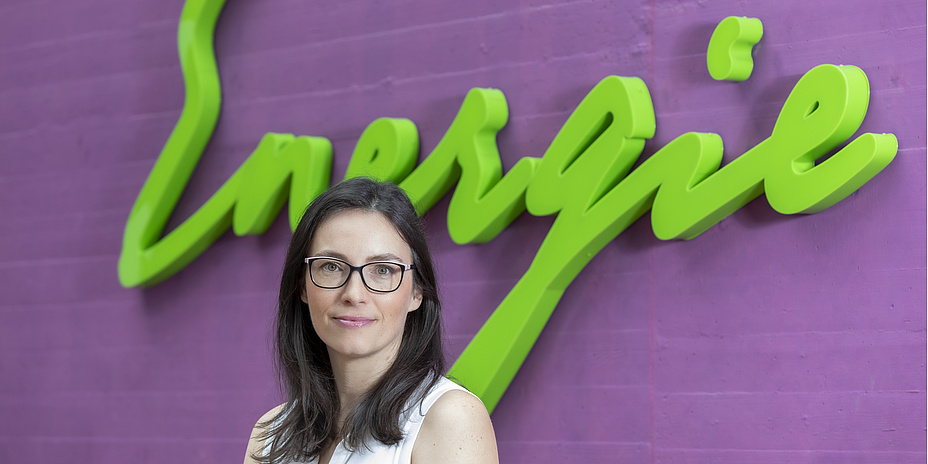A day with... Sonja Wogrin

Here, the native of Carinthia and her team face the challenges of a future that comes with the sustainable changes in energy systems.
6:30 a.m.
The alarm clock rings. Sonja Wogrin wakes up her daughters Emma (6 years old) and Martina (5 years old).
7:00 a.m.
Breakfast: The girls eat cornflakes and drink cocoa, there is no time for a morning snack for mum. “I’m busy motivating the girls. The girls are small Austrian-Spanish hybrids and have a different feel for time – a Spanish one. If I’m not behind it, nothing moves forward in the morning,” says the 38-year-old laughing.
7:35 a.m.
Sonja Wogrin swings onto her cargo e-bike. Part of the cargo are the two little ladies, school and kindergarten bags and on Wednesdays the guitar for Emma’s guitar lessons. The older one is taken to VS Eisteich (primary school), the younger one to the nanoversity (nursery school).
7:55 a.m.
Arrival at the Institute. “I am always the last one at the Institute. I have such hard-working staff who are so passionate about their subjects that they are in the office very early.” Now there is time for the first coffee. Wogrin sits down with her team for the informal regular morning meeting, which is a healthy mix of the personal and professional.
8:20 a.m.
Emails are checked and the to-do list for the day is made.
9:00 am
Meeting with PhD student Thomas Klatzer, who is working on integrated energy system modelling and sector coupling.
10:00 am
Regular meeting with the team, which takes place once a week. PhD students report on their work, research projects are talked over, and urgent matters from the field of teaching are discussed.
11:30
Time to go to the canteen. The whole team picks up a lunch “to go” in the canteen and sits down together at the Institute. “I must have introduced Spanish customs here. In the past, the meal took about 20 minutes, but now people chat longer with each other while enjoying lunch.”
12:30
The professor of electricity economics and energy innovation is working on a paper about energy communities. “I have a lot of fun when I get to programme something,” says the technical mathematician. “Research is a playground for me, I like being creative and solving new problems.” For example, she programmes models on the computer, so-called digital twins, which can be used to simulate the Austrian and European electricity systems. In this way, different aspects of the energy sector can be examined.
15:00
The new Research Center (RC) for Energy Economics and Energy Analytics (ENERGETIC) opened in mid-April. Wogrin is the spokesperson for the RC: “The Research Center is about the energy transition and how we can achieve it. This latest research centre at TU Graz supports the transformation of energy systems towards complete decarbonisation with interdisciplinary cutting-edge research. This requires innovative and interdisciplinary approaches to solutions, which is why 33 people from all faculties are also involved in the centre.” Together with colleagues from process engineering, a research project is discussed that was developed within the framework of the RC.
16:30
Sonja Wogrin is on her way to pick up her daughters. After that, they go shopping. At home, they play in the garden, fool around and sing, reading is practised with the older girl and they jump on the trampoline.
18:30
They eat the evening meal together. There is always a hot meal, ranging from spaghetti to lentil stew or quesadillas. At home, Spanish is the only language spoken with the children; dad is Spanish, an entrepreneur, and works from home.
20:00
The girls are (hopefully) in bed. Sonja Wogrin practises the guitar or reviews the day with her husband David. When David picks up the kids in the afternoon, Sonja Wogrin can devote herself to a new passion: bouldering. “I only discovered climbing on my return to Austria. I love it!”
22:00
Bedtime. Good night!
Sonja Wogrin studied technical mathematics at TU Graz. She completed a Master’s degree at the Massachusetts Institute of Technology, and in 2013 she received her doctorate from the Universidad Pontificia Comillas in Spain, where she is also associate professor. She took up her professorship at TU Graz in August 2021. “We are working in teaching and research on how we can achieve climate neutrality and how it can be a success,” explains the scientist. “We want to make this world a better place.” For example, the Institute works closely with the Federal Ministry of Climate Action and Energy (BMK), makes calculations on the Austrian energy infrastructure and advises the BMK on the energy transition. “It is our great goal that our voice, the voice of researchers, is also heard in the ministry.”
Sonja Wogrin's tips for saving energy
And what are your personal tips for saving energy? Firstly, it would be important to look at the thermal insulation of our homes, because an immense amount of energy is lost through poor insulation. Secondly, how do I organise my life with mobility? “Of course, this depends on where I live,” Sonja Wogrin emphasises. “But in the city there are alternatives such as public transport or cycling.” Thirdly, it would be good to upgrade our homes with PV panels or replace the oil and gas heating with a heat pump. “The cost factor plays a big role here: can I afford it? And do I want to afford it? But we should all think about what we can do personally for the environment. This path is part of the solution, it is the only way we can achieve the energy transition, a complete decarbonisation,” says the convinced researcher.



